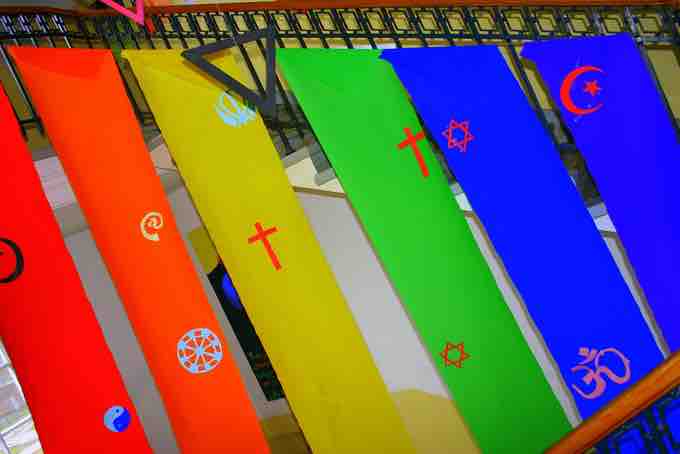Religion in the United States is characterized by both a wide diversity in religious beliefs and practices and by a high adherence level. A majority of Americans report that religion plays a "very important" role in their lives, a proportion unique among developed nations. Many faiths have flourished in the United States, including those spanning the country's multicultural immigrant heritage, as well as those founded within the country; these have led the United States to become one of the most religiously diverse countries in the world.
The U.S. Census does not ask about religion. Various groups have conducted surveys to determine approximate percentages of those affiliated with each religious group. Some surveys ask people to self-identify, while others calculate church memberships. According to the census, religion in the United States is comprised of Christianity, Judaism, Islam, Buddhism, Hinduism, and the unaffiliated, including atheists or agnostics.
The largest religion in the United States is Christianity, practiced by the majority of the population. Due to its large population and history, the United States has numerically more Christians (and more Protestants) than any other country in the world. After Christianity and no-religion, Judaism is the third-largest religious affiliation in the United States, though this identification is not necessarily indicative of religious beliefs or practices. A significant number of people identify themselves as American Jews on ethnic and cultural grounds, rather than religious ones. On the other hand, American Islam effectively began with the arrival of African slaves. It is estimated that about 10% of African slaves transported to the United States were Muslim. Research indicates that Muslims in the United States are generally more assimilated and prosperous than Muslims in Europe.
Religious pluralism is an attitude or policy regarding the diversity of religious belief systems co-existing in society. Religious pluralism is sometimes used as a synonym for interfaith dialogue. Interfaith dialogue refers to dialogue between members of different religions for the goal of reducing conflicts between their religions and to achieve agreed upon mutually desirable goals. Freedom of religion encompasses all religions acting within the law in a particular region, whether or not an individual religion accepts that other religions are legitimate or that freedom of religious choice and religious plurality, in general, are good things.

Religious Diversity
Religious symbols represented in this picture reflect the religious diversity in the United States. Among the symbols one can recognize Islam, Judaism, Christianity, and Buddhism.